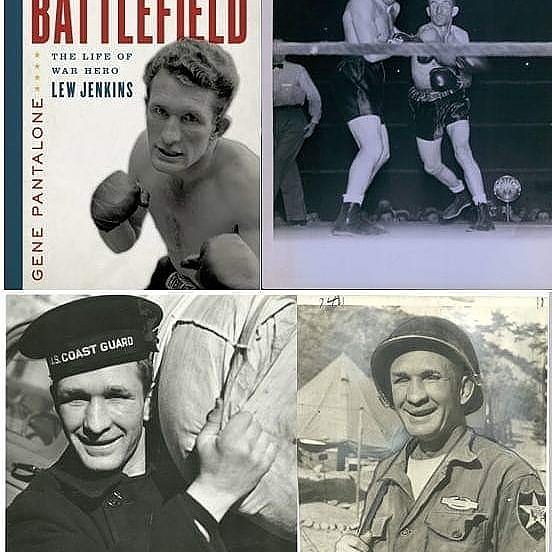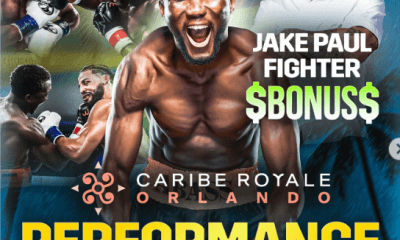Featured Articles
Lew Jenkins: An Improbable Story of Redemption

In the early 2000’s Nicaraguan brawler Ricardo Mayorga took the welterweight and middleweight divisions by storm with his circus like nature out of the ring, his in-ring antics, and devastating power punching. Some of these crazy antics included showing up to press conferences drinking beer and smoking cigarettes, arriving at weigh-ins eating all types of junk food, and shouting every derogatory term under the sun at his opponent. His persona took the boxing world by storm and Mayorga had his moment in the sun. Despite not having pure boxing talent or a high in-ring I.Q., he was able to ride the wave of both his steel chin and power punch to multimillion dollar paydays against some of the best fighters of his generation.
While Mayorga seemed to be a fighter from out of this world, an aberration from the sport’s elite athletes, what he turned out to be was a fighter that harkened back to a time when those types of antics were not just viewed as something done to help give fights a promotional boost. No, they were the type of carefree antics that a certain lightweight champion of the world, who himself was an anomaly, found solace in during his reign at the top. Enter Lew Jenkins who took New York City and the lightweight division by storm in the late 30’s and early 40’s while becoming one of the sport’s most popular champions.
Lew Jenkins life story is full of anecdotes that not even the best Hollywood screenwriters could come up with. During the height of his popularity, he was the toast of the town as he hobnobbed with some of the biggest names in entertainment, like becoming one of Humphrey Bogart’s drinking buddies. However, unlike the aforementioned Mayorga, it would be what Jenkins did after his career in the ring that would define him not only as a man, but as a true American Hero.
Author Gene Pantalone delves into the life of Lew Jenkins in his latest book: From Boxing Ring to Battlefield: The Life of War Hero Lew Jenkins. In just two-hundred pages Pantalone tells the incredible story of Jenkins’ life. “I was doing research for my first book (Madame Bey’s: Home to Boxing Legends),” said Pantalone, when his name kept coming up, since Lew was one of the fighters that trained at that legendary training camp. After finishing the first book I started gathering more and more information about Jenkins. He just seemed to be a fascinating character, his dirt-poor upbringing, how he couldn’t hold on to his riches, and how he eventually found meaning in his life in the most unlikely of places.”
Lew Jenkins was born and raised in Texas during the Great Depression and quickly found himself traveling around the state fighting in carnivals for cash prizes. Utilizing boxcar trains to travel free of cost, it was during his countless fights in the traveling circus and barrooms where Jenkins both gained fighting experience and developed his deadly right hand. “It wasn’t long before he found his way to New York City. Boxers can train all they want, and this is an opinion that’s shared by many, but you have to be born with that kind of punch, the type that Lew had. When I interviewed Lew’s son he told me that his father mentioned to him that when he was fighting his opponents appeared to be moving in slow motion. That actually helped him find the openings to throw the punch.”
What Pantalone is describing is the fact that Lew Jenkins would come to be recognized as one of the strongest punchers in the history of boxing. In fact, Jenkins was listed at number sixty-two on the list of the top one hundred hardest punchers in boxing history by The Ring magazine. It would indeed be his punching power, especially with the right hand, that would take Jenkins to the top of the lightweight division when he blew away Lou Ambers to capture the title.
“When I was collecting my research on Jenkins, I focused on information not just about Jenkins, but also about his fights,” said Pantalone. That’s where I got a lot of quality stuff, especially from the work of W.C. Heinz. It was as if his fascination with Jenkins became mine.” Through all the research conducted by Pantalone and all the crazy stories regarding Jenkins’ antics during his rise through the ranks in New York City, it was what Jenkins did after his boxing career was over that truly captured Pantalone’s imagination.
“I read an article on Boxing.com written by Clarence George and Lew Jenkins grandson made a comment in the section below the article. So, I obtained his e-mail and was able to speak with the son through the grandson.” At first the Jenkins family was reluctant to participate in the project since their father and grandfather had been portrayed as the “playboy champion that fought drunk,” or the champion that squandered his ring earnings on the nightclub scene in New York. “I turned over pages of notes and the first draft, about a hundred pages, to the son and since I also focused on what Jenkins did during his life away from the ring, they agreed to participate with the telling of his story,” states Pantalone.
After Lew Jenkins finished his career in the ring he was still in what today would be considered a fighter’s physical prime, even though burning the proverbial candle at both ends had taken its toll on his natural abilities. Jenkins was able to refocus his life and dedicated it to serving his country when he joined the Armed Forces to serve in War World II. It would be his experiences as a soldier, in World War II and then in Korea, that would reshape Lew Jenkins at his core. “He completely stopped drinking and after his horrific and subsequent heroic efforts in the Korean War he stopped smoking cigarettes,” notes Pantalone.
Anything that he did inside of the ring came naturally to Jenkins. However, it was the amount of hard work and dedication as a soldier that unlike boxing didn’t come naturally to him. As a result, all his accomplishments and the courage he displayed during his military career, (which included being awarded the Silver Star) is what truly defined the man that was Lew Jenkins.
From Boxing Ring to Battlefield is a must-read for all boxing fans. Throughout the two-hundred pages, Gene Pantalone does a terrific job at engaging the reader and making him become invested in the development of Jenkins as if it was a life story being played out in real time. Pantalone also does a great job telling the stories of the people that played different roles in Jenkins life. He covers his two complex marriages (including his first marriage to Katie Taylor, one of boxing’s first female managers, who is a fascinating person in her own right), as well as the intriguing relationships with managers, fellow fighters, celebrities, and the military men with whom he served and would eventually help to rescue from a hell on earth.
“There aren’t many pictures of Jenkins. The funny thing is he said he felt more relaxed during war time. If you look at the pictures of him during his military career he is smiling, while the pictures you see of him during his boxing days he tends to have a stoic expression,” says Pantalone. Historians of both boxing and the military are treated to a tale of one man’s spectacular life journey to redemption.
If not for Pantalone this is the type of story that may have been lost in the annals of time. Lew Jenkins may have been viewed as just another lightweight champion from years past. Instead readers are now able to connect with an intriguing character who finds purpose in the most unlikely of places during a period of time that is becoming more and more distant.
Luis A. Cortes writes from Philadelphia. He can be reached at Luisacortes83@gmail.com His twitter handle is @LC3Boxing
Check out more boxing news on video at The Boxing Channel
To comment on this story in The Fight Forum, CLICK HERE
-

 Featured Articles3 weeks ago
Featured Articles3 weeks agoThe Hauser Report: Cinematic and Literary Notes
-

 Featured Articles4 weeks ago
Featured Articles4 weeks agoOscar Duarte and Regis Prograis Prevail on an Action-Packed Fight Card in Chicago
-

 Book Review3 weeks ago
Book Review3 weeks agoMark Kriegel’s New Book About Mike Tyson is a Must-Read
-

 Featured Articles1 week ago
Featured Articles1 week agoThe Hauser Report: Debunking Two Myths and Other Notes
-

 Featured Articles2 weeks ago
Featured Articles2 weeks agoMoses Itauma Continues his Rapid Rise; Steamrolls Dillian Whyte in Riyadh
-

 Featured Articles4 weeks ago
Featured Articles4 weeks agoRahaman Ali (1943-2025)
-

 Featured Articles4 weeks ago
Featured Articles4 weeks agoTop Rank Boxing is in Limbo, but that Hasn’t Benched Robert Garcia’s Up-and-Comers
-

 Featured Articles3 weeks ago
Featured Articles3 weeks agoKotari and Urakawa – Two Fatalities on the Same Card in Japan: Boxing’s Darkest Day




















